247 scholarly books by University Press of New England and 9
start with N
247 scholarly books by University Press of New England and 9
247 scholarly books by University Press of New England
9 start with N start with N
9 start with N start with N
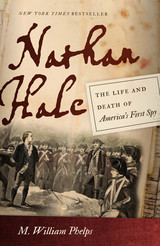
Nathan Hale
The Life and Death of America's First Spy
M. William Phelps
University Press of New England, 2015
Although famous for his purported last words—“I only regret that I have but one life to lose for my country”—few people know the real Nathan Hale. M. William Phelps brings into focus the life of this famed patriot and first spy of the American Revolution, charting Hale’s rural childhood, his education at Yale, and his work as a schoolteacher. Like many young Americans, he was soon drawn into the colonies’ war for independence and became a captain in Washington’s army. When the general was in need of a spy, Hale willingly rose to the challenge, gathering intelligence behind British lines on Long Island, and in the end bravely sacrificing his life for the sake of American liberty. Using Hale’s own journals and letters as well as testimonies from his friends and contemporaries, Phelps depicts the Revolution as it was seen from the ground. From the confrontation in Boston to the battle for New York City, readers experience what life was like for an ordinary soldier in the struggling Continental Army. In this impressive, well-researched biography, Phelps separates historical fact from long-standing myth to reveal the truth about Nathan Hale, a young man who deserves to be remembered as an original American patriot.
[more]
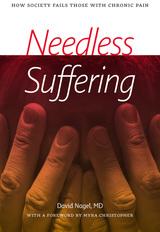
Needless Suffering
How Society Fails Those with Chronic Pain
David Nagel
University Press of New England, 2016
Needless Suffering offers a sociological examination of a complex medical problem: chronic pain and the inability of doctors and other health professionals to understand and manage it in their patients. People in pain, writes Dr. David Nagel, are the poor of the medical world. Like the poor, they are stigmatized and left at the mercy of powerful social actors who tend to work in their own self-interest, frequently at the expense of those they propose to serve. This leaves those who suffer with little control over their own destinies and creates a dysfunctional status quo that harms instead of helps. Drawing on his own experience witnessing his mother’s chronic pain and numerous clinical stories from over thirty years’ expertise as a pain management specialist, Nagel looks first at patients, their families, and their doctors (usually not trained in pain management), and then broadens his canvas to elaborate a pain power structure that includes the entire healthcare community, insurers, lawyers, government regulators, employers, politicians, law enforcement agencies, and painkilling drugs. Concluding with concrete reforms to create more effective and compassionate pain care, this book is designed for pain patients and their families, healthcare providers, legislators and other public policymakers, judges, personal injury and other attorneys, insurers, government regulators, law enforcement personnel, and health care businesspeople.
[more]

New England Wildlife
Habitat, Natural History, and Distribution
Richard M. DeGraaf and Mariko Yamasaki
University Press of New England, 2000
New England Wildlife presents the natural histories and distributions of 338 inland wildlife species in New England. It also details the habitat relationships of all New England terrestrial and aquatic species, presented in sections on amphibians and reptiles, birds, and mammals. Each species account includes an illustration and range map, along with information on distribution in the region, status, habitat, special habitat requirements, details of breeding biology, home range and movements, and food habits, each fully documented from the pertinent literature. The introduction includes a brief land-use history of the region, descriptions of forest types and nonforest habitats, and wildlife responses to landscape change. A necessity for all land managers and naturalists as well as birders, walkers, nature lovers, residents, and visitors to New England, the book includes the most recent information on natural history and distribution, and matrices relating all species to standard classifications of forest cover - types and nonforest habitats.
[more]
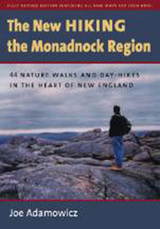
The New Hiking the Monadnock Region
44 Nature Walks and Day-Hikes in the Heart of New England
Joe Adamowicz
University Press of New England, 2007
The New Hiking the Monadnock Region will lead you through forests and meadows, over small mountains and gentle hills, around ponds and sanctuaries, and along streams and abandoned roads. This detailed and informative guide, fully expanded and updated, now includes a beautifully rendered map for each hike and also provides information on flora and fauna, as well as local history and nearby sightseeing destinations. In addition, the book contains specialized information for the beginning hiker and for parents hiking with children, lists of hiking and conservation organizations, and other helpful resources. Whether you’re a seasoned hiker, a family with children, an amateur naturalist, a lifelong resident of the region, or a visitor, this is your essential guide to enjoying one of the most popular outdoor recreation spots in the northeast.
[more]
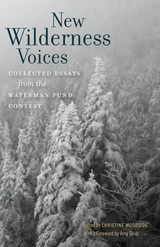
New Wilderness Voices
Collected Essays from the Waterman Fund Contest
Edited by Christine Woodside
University Press of New England, 2017
Guy and Laura Waterman spent a lifetime reflecting on and writing about the mountains of the Northeast. The Waterman Fund seeks to further their legacy of stewardship through an annual essay contest that celebrates and explores issues of wilderness, wildness, and humanity. Since 2008, the Waterman Fund has partnered with the journal Appalachia in seeking out new and emerging voices on these subjects, and in publishing the winning essay in the journal. Part of the contest’s mission is to find and support such emerging writers, and a number of them have gone on to publish other work in Appalachia or their own books. The contest has succeeded admirably in fulfilling its mission: new writers have brought fresh perspectives to these timeless issues of wilderness and wildness. In New Wilderness Voices these winning essays are collected for the first time, along with the best runners-up. Together, they make up an important and celebratory addition to the growing body of environmental literature, and shed new light on our wild spaces.
[more]

No Boston Olympics
How and Why Smart Cities Are Passing on the Torch
Chris Dempsey and Andrew Zimbalist
University Press of New England, 2017
In 2013 and 2014, some of Massachusetts’ wealthiest and most powerful individuals hatched an audacious plan to bring the 2024 Summer Olympics to Boston. Like their counterparts in cities around the world, Boston’s Olympic boosters promised political leaders, taxpayers, and the media that the Games would deliver incalculable benefits and require little financial support from the public. Yet these advocates refused to share the details of their bid and only grudgingly admitted, when pressed, that their plan called for billions of dollars in construction of unneeded venues. To win the bid, the public would have to guarantee taxpayer funds to cover cost overruns, which have plagued all modern Olympic Games. The United States Olympic Committee (USOC) chose Boston 2024’s bid over that of other American cities in January 2015—and for a time it seemed inevitable that the International Olympic Committee (IOC) would award the Games to Boston 2024. No Boston Olympics is the story of how an ad hoc, underfunded group of diverse and engaged citizens joined together to challenge and ultimately derail Boston’s boosters, the USOC, and the IOC. Chris Dempsey was cochair of No Boston Olympics, the group that first voiced skepticism, demanded accountability, and catalyzed dissent. Andrew Zimbalist is a world expert on the economics of sports, and the leading researcher on the hidden costs of hosting mega-events such as the Olympics and the World Cup. Together, they tell Boston’s story, while providing a blueprint for citizens who seek to challenge costly, wasteful, disruptive, and risky Olympic bids in their own cities.
[more]
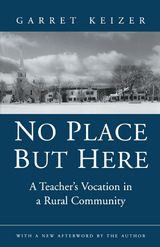
No Place But Here
A Teacher’s Vocation in a Rural Community
Garret Keizer
University Press of New England, 1996
Weaving anecdotal narrative with trenchant reflections on his profession, Garret Keizer offers one teacher's answer to the hue and cry over the crisis in education. An English teacher in rural Vermont, he writes of the opposing realities he faces every day: the promise and energy of the young and the oppressive effect of their economic disadvantages; the beauty of the countryside and its people and the harsh, sometimes ugly edge of life there; the need for discipline and the importance of rebellion. In exploring the demands peculiar to his own community, Keizer movingly depicts the difficulties-some triumphantly overcome, some overwhelming-that form the heart of teaching anywhere.
[more]

No Sanctuary
Teachers and the School Reform That Brought Gay Rights to the Masses
Stephen Lane
University Press of New England, 2018
School can be a special sort of nightmare for LGBTQ youth, who are sometimes targets of verbal or physical harassment with nowhere to turn for support. No Sanctuary tells the inspiring story of a mostly unseen rescue attempt by a small group of teachers who led the push to make schools safer for these at-risk students. Their efforts became the blueprint for Massachusetts’s education policy and a nationwide movement, resulting in one of the most successful and far-reaching school reform efforts in recent times. Stephen Lane sheds light on this largely overlooked but critical series of reforms, placing the Safe Schools movement within the context of the larger gay rights movement and highlighting its key role in fostering greater acceptance of LGBTQ individuals throughout society.
[more]
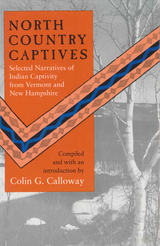
North Country Captives
Selected Narratives of Indian Captivity from Vermont and New Hampshire
Edited by Colin G. Calloway
University Press of New England, 1992
Revealing firsthand narratives of Indian captivity from eighteenth-century New Hampshire and Vermont. Narratives of Europeans who experienced Indian captivity represent one of the oldest genres of American literature. They are often credited with establishing the stereotype of Indians as cruel and bloodthirsty. While early southern New England accounts were heavily influenced by a dominant Puritan interpretation which had little room for individual and cultural distinctions, later northern New England narratives show growing independence from this influence. The eight narratives selected for this book challenge old stereotypes and provide a clearer understanding of the nature of captive taking. Indians used captives to replace losses in their tribes and families, and also to participate in the French and British ransom market. These stories portray Indian captors as individuals with a unique culture and offer glimpses of daily life in frontier communities. Calloway complements them with valuable historical background material. His book will appeal especially to readers interested in Native American peoples and life on the north country frontier of Vermont and New Hampshire.
[more]
READERS
Browse our collection.
PUBLISHERS
See BiblioVault's publisher services.
STUDENT SERVICES
Files for college accessibility offices.
UChicago Accessibility Resources
home | accessibility | search | about | contact us
BiblioVault ® 2001 - 2024
The University of Chicago Press









